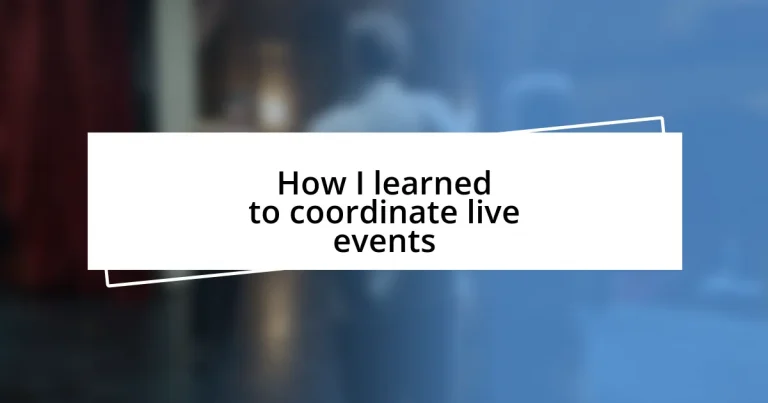Key takeaways:
- The author’s passion for event coordination ignited during a friend’s wedding, highlighting the joy of transforming visions into experiences.
- Essential skills for success in event coordination include strong communication, time management, problem-solving, attention to detail, and creativity.
- Building a reliable vendor network is crucial, with relationships ensuring consistent quality and trust during high-pressure situations.
- Flexibility, being present, and actively seeking feedback are key lessons learned, contributing to improved event execution and personal growth.
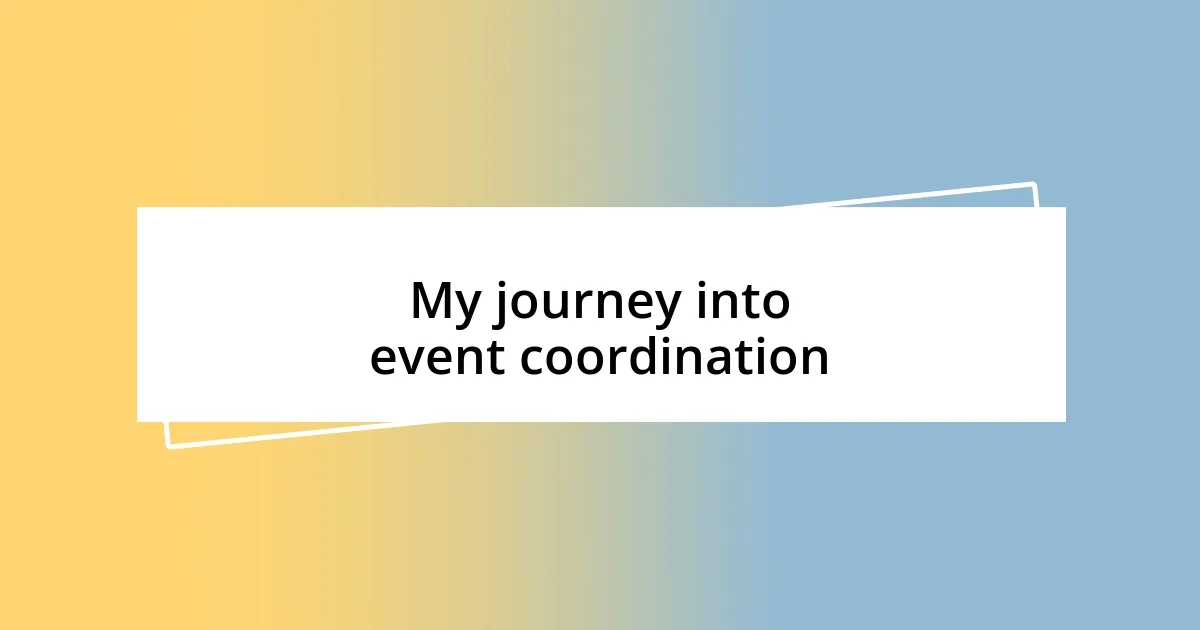
My journey into event coordination
My journey into event coordination began unexpectedly at a friend’s wedding. I stepped in last minute to help with their seating arrangement, and as I shuffled around creating a beautiful layout, I felt a rush of excitement. It was in that moment that I realized how much I enjoyed the thrill of transforming a vision into an actual experience.
As I got deeper into the world of events, I often found myself asking, “What makes a gathering truly memorable?” It became my mission to discover this by volunteering for local community events. There was a particularly hectic festival where everything seemed to go wrong – a missing sound system, last-minute catering changes – but amidst the chaos, I learned to think on my feet and adapt quickly. Those high-pressure situations became invaluable lessons for me.
With every event I coordinated, I discovered another piece of myself. I remember the joy on people’s faces as they mingled and danced, and I couldn’t help but wonder: how can I create more moments like this? Each successful event fueled my passion, and the sense of community I helped foster kept me motivated to keep pushing my limits further.
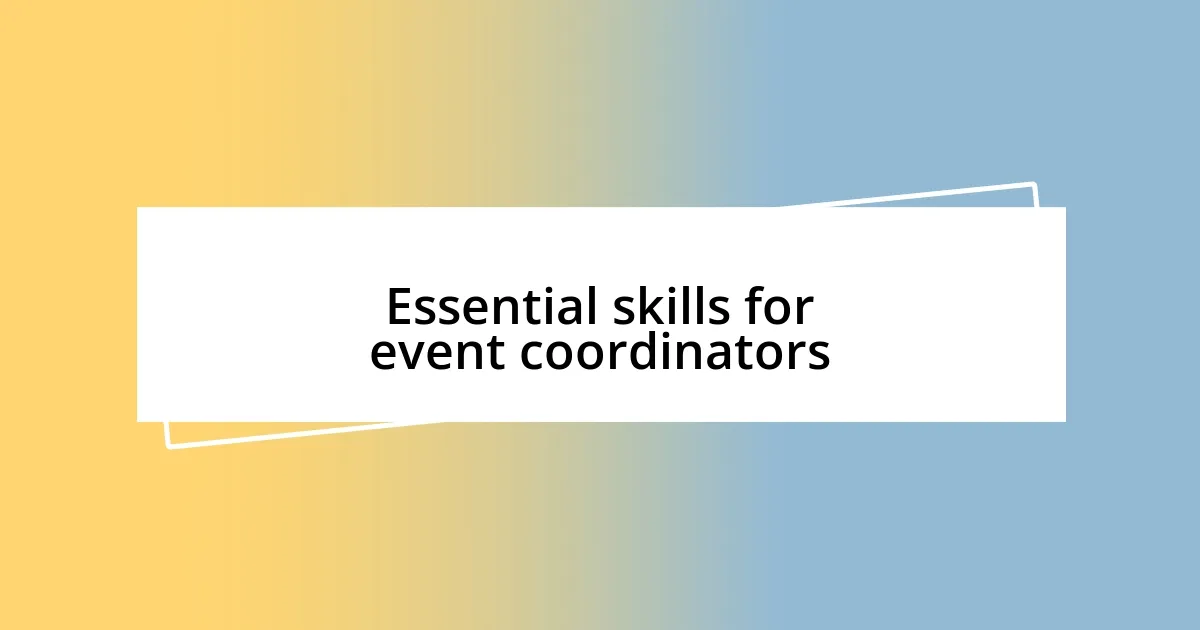
Essential skills for event coordinators
To thrive in event coordination, certain skills are non-negotiable. One of the key abilities I cherish is strong communication. When organizing events, you’ll find yourself in constant dialogue with vendors, clients, and attendees. I vividly remember a time when I had to facilitate a crucial conversation between a caterer and a venue owner who were at odds over timings. My ability to listen and mediate led to a satisfying resolution, ensuring the event went off without a hitch.
Here’s a quick list of essential skills for any aspiring event coordinator:
- Time Management: Balancing multiple tasks efficiently is a must.
- Problem-Solving: You’ll face unexpected challenges; staying calm under pressure is important.
- Attention to Detail: Small details can make or break an event.
- Creativity: Crafting unique experiences that resonate with guests is crucial.
- Team Leadership: Coordinating a team effectively helps your vision come to life.
Each skill complements the other, creating a balanced toolkit that helps you shine in live event coordination.
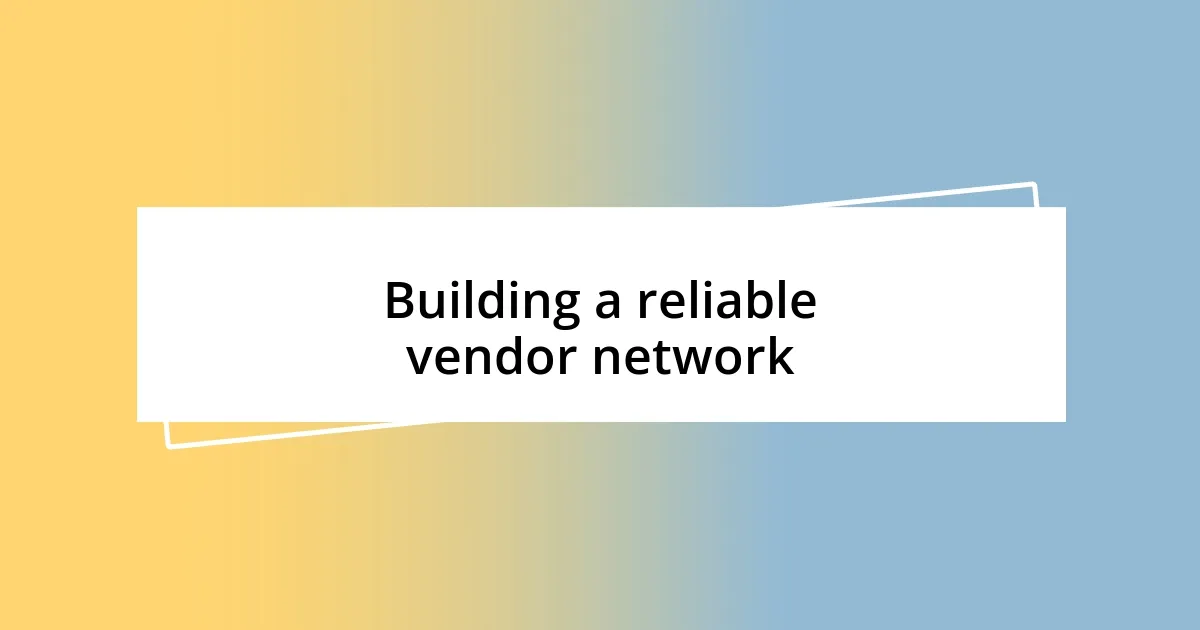
Building a reliable vendor network
Building a reliable vendor network is crucial in the world of event coordination. I remember my early days, hunting for vendors felt like searching for a needle in a haystack. What I learned was that establishing relationships with reliable vendors transformed my work. By attending industry events and networking functions, I discovered that getting to know the people behind the services added a personal touch. It wasn’t just about getting a good deal; it was about building a connection that I could rely on when the pressure was on.
One of the best decisions I made was creating a shortlist of trusted vendors based on previous experiences. For instance, I had a wonderful collaboration with a florist who not only delivered gorgeous arrangements but also understood my vision intuitively. This established trust meant that I could confidently recommend them to clients, knowing they’d never disappoint. Sharing experiences like this with other coordinators also helped expand my network.
To illustrate the benefits of working with reliable vendors, here’s a comparison table of working with known vendors versus unknown sources based on my experience:
| Known Vendors | Unknown Vendors |
|---|---|
| Established trust over time | No previous relationship |
| Consistent quality assurance | Inconsistent service quality |
| Quick response times | Longer communication delays |
| Better negotiation opportunities | Price uncertainty |
| Personalized service | Generic solutions |
Building a network like this requires effort, but the rewards—like peace of mind and seamless event execution—are absolutely worth it. It’s about creating a circle of trust that you can call on time and again, making each event not just a challenge, but an adventure filled with strong partnerships.
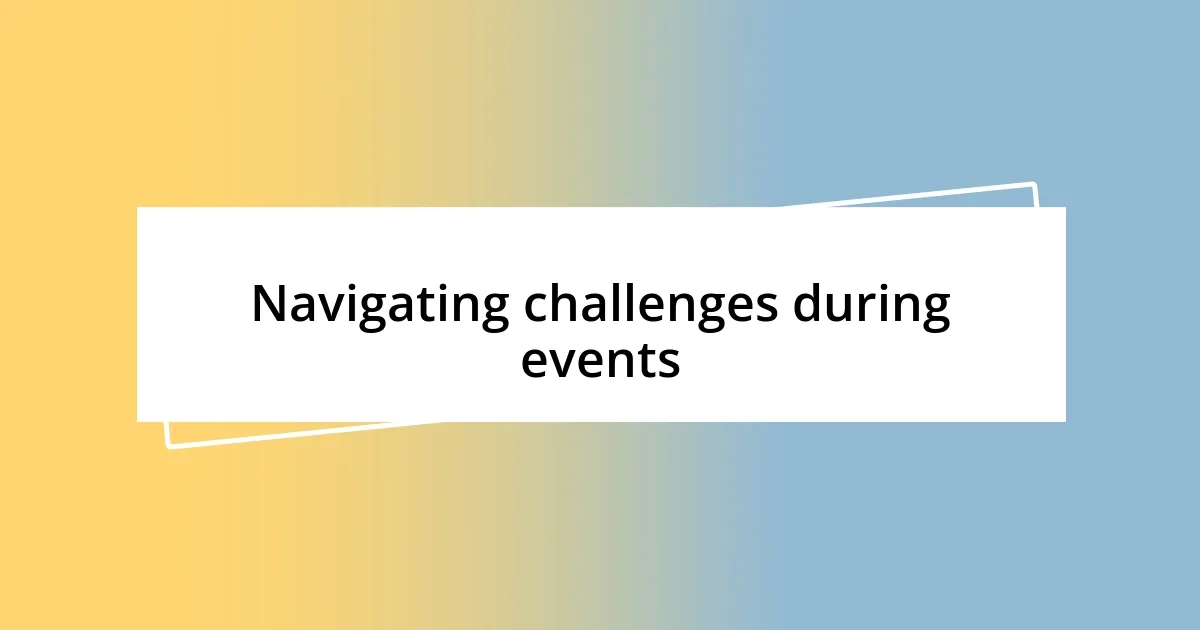
Navigating challenges during events
When it comes to navigating challenges during events, the unexpected can often feel like the norm. I recall one time when the sound system failed just as the keynote speaker was about to begin. My heart raced, but instead of panicking, I quickly rallied my team and improvised. We set up a backup system, and the event continued without a hitch. How often do we let stress dictate our choices? Staying calm and embracing creativity during crises can turn potential disasters into memorable moments.
Another challenge I frequently encounter is managing diverse expectations among stakeholders. Each person involved—from clients to attendees—has their own vision for what the event should be. I had a situation where a client wanted a formal gala while the venue manager envisioned a more casual setup. This could have escalated into a larger conflict, but I stepped in as a mediator. By facilitating a meeting where everyone could voice their concerns, we found common ground and ultimately designed an event that honored both perspectives. Isn’t it fascinating how dialogue can transform disagreements into collaboration?
Lastly, there’s the ever-present challenge of logistics. I remember overseeing an outdoor event where a last-minute storm warning forced us to change plans swiftly. My instinct was to panic, but instead, I took a deep breath, assessed our options, and coordinated a venue switch within a couple of hours. Relying on my network, I secured a space that not only met our needs but also brought new energy to the gathering. These moments reinforce the importance of adaptability and quick thinking—essential qualities for any event coordinator. Have you ever had to think on your feet in a high-pressure situation? Those experiences often mold us into more resilient professionals.
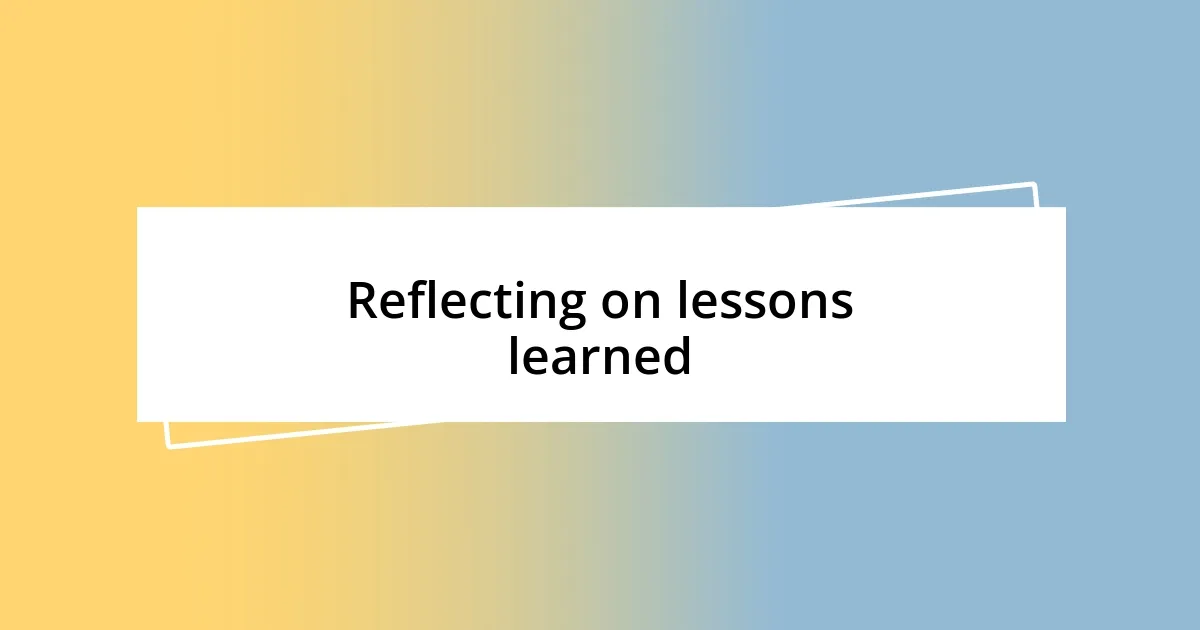
Reflecting on lessons learned
Reflecting on my experiences in event coordination has revealed some invaluable lessons. One pivotal moment was when an unforeseen issue arose during a large wedding I was managing. The cake delivery was delayed due to traffic, and the couple was understandably stressed. In that moment, I realized the importance of having contingency plans. I quickly proposed a creative alternative; we served dessert while the guests mingled, keeping the celebration flowing. That experience taught me that flexibility not only resolves crises but also enhances the overall event experience.
One lesson that stands out is the value of being present during events. I’ll never forget a charity gala I coordinated where I found myself too focused on logistics. I barely engaged with guests and ultimately missed the spontaneous, heartfelt speeches that made the evening magical. This taught me a crucial insight: the essence of an event lies in the moments shared, not just the meticulously planned details. Have you ever been so busy managing that you missed out on the real magic happening around you? Shifting focus to embrace the experience can profoundly affect the event’s atmosphere.
Another significant takeaway has been the power of feedback after each event. After wrapping up a conference, I organized a debriefing session with my team. We discussed what went well and what could be improved. While it felt daunting to face criticism, I discovered that these candid conversations enrich our skills and strengthen our bond. It’s amazing how a team that learns together grows together. Isn’t it fascinating how vulnerability fosters growth in our professional relationships? The iterative nature of feedback is essential for continuous improvement in the world of event coordination.












